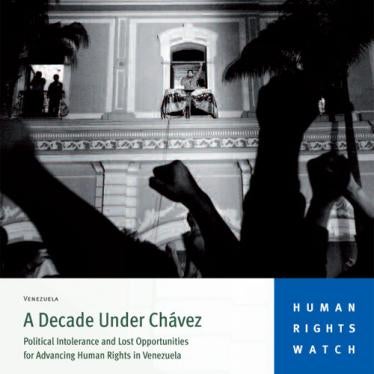The draconian fine imposed on Venezuelan television station Globovisión for reporting on a prison riot harms freedom of expression in the country, Human Rights Watch said today. The administrative action against the only television channel available without cable that remains critical of President Hugo Chávez’s government could undermine Venezuelans’ ability to obtain diverse information, Human Rights Watch said.
On October 18, 2011, the National Telecommunications Commission (Comisión Nacional de Telecomunicaciones, CONATEL) imposed a fine of 9.300.000 bolívares (approximately US $2.1 million) on Globovisión for allegedly violating a broadcasting statute when it aired images of a prison riot in June.
“The Chávez government seems determined to drive its critics off the airwaves,” said José Miguel Vivanco, Americas director at Human Rights Watch. “Imposing a multi-million dollar fine on a channel for reporting unfavorable news is simply the latest tool for targeting opposition broadcasters.”
CONATEL opened an investigation after Globovisión repeatedly aired testimonies from family members of prisoners involved in a riot and clashes between inmates and members of the National Guard in El Rodeo prison in June. The clashes led to several deaths and injuries on both sides.
The testimonies alleged that members of the National Guard were “massacring,” “killing,” “burning,” and “beating” prisoners. CONATEL said it would also investigate Globovisión for airing images of members of the National Guard throwing teargas canisters, a security force vehicle dispersing protesters with a water cannon, a helicopter flying over the area, and people hiding to avoid the teargas while playing “music similar to that used in war documentaries.”
CONATEL ruled that Globovisión had violated the broadcasting statute by inciting the commission of crimes and inciting “disrespect for the law,” “altering public order,” and “fueling fear in the citizenry, incitement to hatred, and intolerance for political reasons.”
Pedro Maldonado, CONATEL’s director general, stated that Globovisión’s coverage was “unacceptable,” claiming that the station on 269 occasions had aired the “most heart-felt” and “desperate” 18 testimonies, while not airing all statements by officials. He also claimed that the station had added the sound of machineguns that were not part of the original audio track. A lawyer for Globovisión denied this allegation.
The fine imposed is equivalent to 7.5 percent of Globovisión’s 2010 income, and has to be paid before December 31, 2011. Globovisión’s lawyer told Human Rights Watch that the channel will have to make a “considerable” effort to pay the fine, and that it “affects the financial stability of the channel and seriously complicates its operations and finances.”
There are six other pre-existing administrative investigations against Globovisión pending before CONATEL, which could result in the station’s suspension or the loss of its license. Two leading journalists from Globovisión told Human Rights Watch that the existence of these investigations has led to self-censorship in the channel.
CONATEL previously drove RCTV, the most popular television station critical of the government in Venezuela, off the air. The agency denied RCTV a renewal of its concession to broadcast on public airwaves in 2007, in an arbitrary and politically discriminatory manner. RCTV International, the cable channel created to replace it, was taken off the air in 2010 after CONATEL ordered cable providers to suspend transmitting channels that did not comply with broadcasting regulations until they applied for, and received, the status of “international” channels (to which these regulations do not apply.) CONATEL has rejected RCTV’s requests to obtain authorization to operate, according to the channel’s lawyers. RCTV International remains unable to transmit in Venezuela.
The decision to open an investigation and the application of sanctions for infractions of broadcasting laws are the responsibility of CONATEL, a body attached to the Ministry of Communication and Information. While defined in law as an autonomous body, CONATEL’s four-person board of directors and its director general are all appointed by the president of Venezuela and can be dismissed at his or her discretion.







